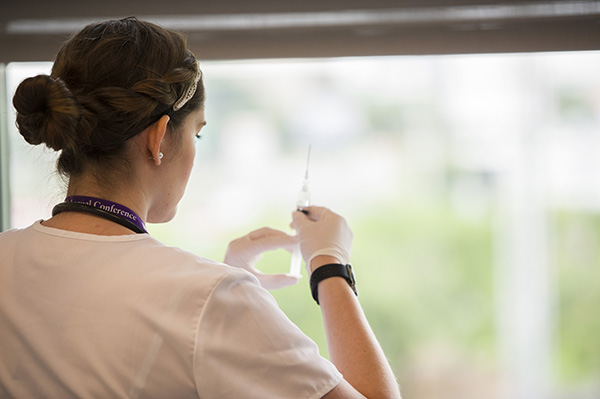Informatics students join groundbreaking precision medicine initiative

September 26, 2018 - DALLAS - What if we were able to pinpoint the contributing factors of Parkinson’s disease and find ways to counteract its progression? Or identify better treatment options for autism or perhaps prevent its symptoms altogether? TWU informatics students have joined a groundbreaking nationwide project that hopes to answer those questions and more.
The initiative, the All of Us Research Program, is hoping to make discoveries like these possible by gathering an unprecedented amount of information to help improve the way we approach health care and treat disease. All of Us seeks to engage one million or more volunteers living in the U.S. to contribute their health data to improve health outcomes, fuel the development of new treatments for disease and catalyze a new era of evidence-based and more precise preventive care and medical treatment.
The All of Us Research Program is a key element of the Precision Medicine Initiative (PMI) which launched in 2016 when the National Institutes of Health (NIH) received $130 million in funding to create a research pool of participants across the county who would donate their health information, including bio samples. The research program is focused on including more participants who reflect the diversity of the United States and who have historically not been a part of medical research.
TWU students became involved with the project when Dr. Mari Tietze, Doswell Endowed Chair of Nursing Informatics, met with project manager Jessica Walker at the Dallas Area Agency on Aging at Community Council of Dallas. Community Council is a partner to All of Us, supporting awareness and education of the program and its value to the community.
Tietze brought in health informatics students to help the Community Council assess its recruitment efforts through use of data analytics and pre- and post-educational surveys. In all, TWU students have contributed hundreds of hours in manpower and have given the Community Council detailed information on what educational methods are the most effective. The Community Council has provided the data analytics to the program with the intent of helping inform the broader engagement efforts of All of Us.
According to Walker, information and transparency are key to getting and keeping people involved. “We’re trying to get the community ready for what is expected of them in the process. People generally aren’t going to respond positively if you come and just tell them - ‘We want your blood,’” she says with a laugh.
Health informatics students have been involved in the initiative since early 2018, and Tietze plans to continue the partnership with the Community Council. The collaboration is beneficial, she believes, for TWU Informatics students’ career development and for the contribution it makes to healthcare. By handling informatics in this project, students are gaining real-world experience that can set them apart in the job market, while seeing first-hand how their work can improve processes and benefit the community.
“The NIH is working to bring minority and underserved communities in our country into research – to fill the gap we’ve had with these populations. It’s really affecting how we manage precision medicine,” says Tietze. “The role of Ms. Walker and her team is to make it really clear that when it comes time to sign up for All of Us, individuals understand the importance of it – as a minority or as someone from an underserved community.”
Media Contact
Page last updated 11:50 AM, November 15, 2022